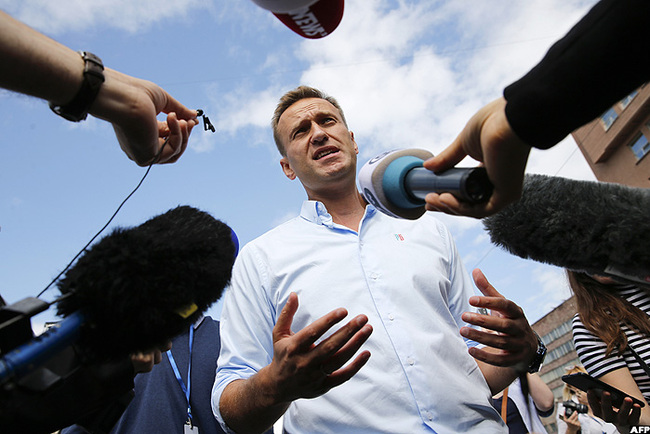Aides denounce 'threat to life' as Navalny refused evacuation
Aides say they believe he was poisoned and that something was put in his tea at an airport cafe.
POLITICS
Aides to Russian opposition figure Alexei Navalny accused doctors of risking his life on Friday by refusing to allow him to be moved from a Siberian hospital after his suspected poisoning.
Navalny, a 44-year-old lawyer and anti-corruption campaigner who is among President Vladimir Putin's fiercest critics, was in a coma in intensive care in Omsk after he lost consciousness while on a flight and his plane made an emergency landing on Thursday.
Aides say they believe he was poisoned and that something was put in his tea at an airport cafe.
An air ambulance was on its way to fly to him to Germany for treatment but Navalny's spokeswoman Kira Yarmysh said doctors were refusing to allow him to be moved.
"The chief doctor stated that Navalny is not transportable" because his condition was "unstable", Yarmysh said on Twitter, calling the decision "a direct threat to his life".
"The ban on the transportation of Navalny is an attempt on his life, which is being made right now by doctors and the deceitful authorities who sanctioned it."
Doctors have said his condition was serious but stable and have yet to make any official diagnosis.
Navalny's team said earlier that the hospital in Omsk was ill-equipped and his doctor, Anastasia Vasilyeva, said she had asked for the Kremlin's help to transfer him to a European clinic.
Yarmysh said an air ambulance dispatched to fly him to Germany for treatment was due to land shortly.
It left Nuremberg early Friday after Chancellor Angela Merkel extended an offer of treatment.
Foreign leaders including Merkel and French President Emmanuel Macron have voiced concern for Navalny, who has faced repeated physical attacks and prosecutions in more than a decade of opposition to Russian authorities.

Tests to continue
He lost consciousness shortly after his plane took off on Thursday from Tomsk in Siberia, where he was working to support opposition candidates ahead of regional elections next month.
Yarmysh said he had seemed "absolutely fine" before boarding the flight and had only consumed a cup of tea at the airport.
She said she was sure he had suffered from an "intentional poisoning" and put the blame on Putin.
"Whether or not he gave the order personally, the blame lies with him," she said.
Kremlin spokesman Dmitry Peskov said claims of poisoning were "only assumptions" until tests proved otherwise.
He wished Navalny a "speedy recovery" after pledging Kremlin help to secure him treatment abroad if needed.
Local media reported Friday that doctors were working on five diagnostic theories and would continue tests during the two coming days.
Amnesty International urged Russia to hold a "prompt and independent investigation" into the incident while European Union foreign affairs chief Josep Borrell said "those responsible must be held to account" if the suspected poisoning was confirmed.
Navalny has made many enemies with his anti-corruption investigations, which often reveal the lavish lifestyles of Russia's elite and attract millions of views online.
Previous poisonings
He has suffered physical attacks in the past, including a 2017 incident where he endured chemical burns to his eye after green dye was splashed on his face.
Last year Navalny said he suspected poisoning when he suffered rashes and his face became swollen while serving a short jail term after calling for illegal protests.
He has been the target of multiple criminal probes and spent numerous stretches in police cells for organising illegal protests, while his Anti-Corruption Foundation was regularly raided by police and investigators.
The latest incident follows several infamous poisonings of Kremlin critics in the past.
Britain named two Russian spies as suspects after Russian double agent Sergei Skripal and his daughter Yulia were poisoned with the nerve agent Novichok in the city of Salisbury in March 2018.
Former Russian security service agent Alexander Litvinenko was fatally poisoned with radioactive polonium in a cup of tea in London. Russia refused to extradite chief suspect Andrei Lugovoi, who became a nationalist MP after the 2006 attack.
Several other opposition figures have suffered severe illnesses in Russia that they blamed on poisoning.